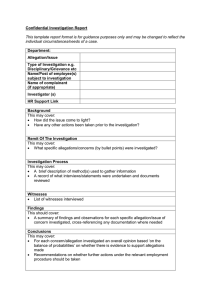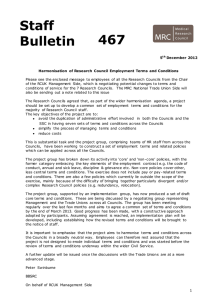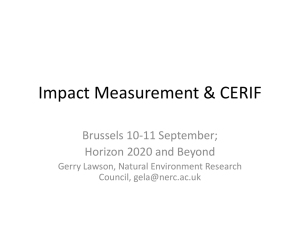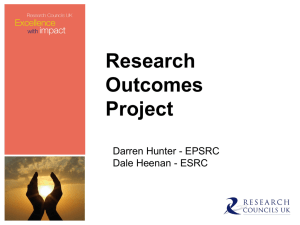RCUK Policy and Guidelines on Governance of Good Research Conduct February 2013
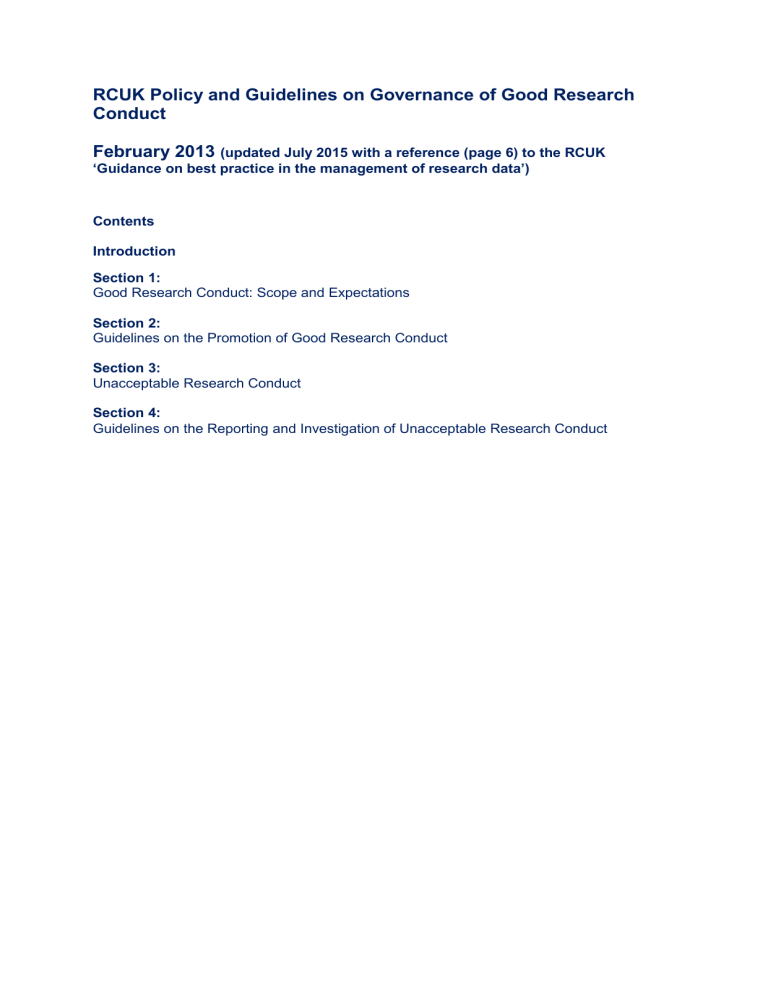
RCUK Policy and Guidelines on Governance of Good Research
Conduct
February 2013
(updated July 2015 with a reference (page 6) to the RCUK
‘Guidance on best practice in the management of research data’)
Contents
Introduction
Section 1:
Good Research Conduct: Scope and Expectations
Section 2:
Guidelines on the Promotion of Good Research Conduct
Section 3:
Unacceptable Research Conduct
Section 4:
Guidelines on the Reporting and Investigation of Unacceptable Research Conduct
INTRODUCTION
A commitment to good research conduct lies at the heart of an effective research system.
High standards of research integrity underpin the quality and reliability of the research outcomes generated and of decisions made in the light of those outcomes.
The UK Research Councils, working through RCUK, have long been committed to maintaining high standards of research conduct within the research communities we support.
As a signatory of the UUK Concordat to support research integrity ,
individuals involved in those communities, including researchers, research support staff, research managers and administrators, to abide by the principles set out in the Concordat , and to work with due respect for one another within a supportive and open environment.
The RCUK Policy and Guidelines builds on growing national and international experience in identifying and promoting good research conduct, and in addressing unsatisfactory conduct.
It sets out RCUK’s approach to the establishment and maintenance of good research conduct, and specify the Research Councils’ expectations. In particular this document:
•
Sets standards of good research practice, with associated guidelines
•
Specifies and describes unacceptable research conduct
•
Provides guidelines for reporting and investigating allegations of research misconduct
•
Clarifies the respective responsibilities of the Research Councils and Research
Organisations in fostering and safeguarding the highest possible standards of research conduct
It should be read in conjunction with the UUK Concordat , and with all relevant statutory and regulatory requirements. The RCUK Policy and Guidelines are intended to apply across the full spectrum of research and training funded by the Research Councils and should be amplified in specific disciplines by the guidance issued by individual Research Councils, other funders, professional associations and learned societies.
This document replaces the RCUK Policy and Code of Conduct on the Governance of Good
Research Conduct published in 2009.
1
Universities UK Concordat to Support Research Integrity: www.universitiesuk.ac.uk/PolicyAndResearch/PolicyAreas/Research/Pages/Researchintegrity.aspx
2
Report of the UK Research Integrity Futures Working Group chaired by Professor Dame Janet Finch (2010): http://www.rcuk.ac.uk/documents/documents/ReportUKResearchIntegrityFutures2010.pdf; Government Office for
Science, Rigour, Respect and Responsibility: A universal ethical code for scientists (2007): www.bis.gov.uk/policies/science/science-and-society/communication-and-engagement/universal-ethical-code ;
UK Research Integrity Office, Code of practice for research: Promoting good practice and preventing misconduct
(2009) www.ukrio.org/what-we-do/code-of-practice-for-research ; The European Science Foundation Code of
Conduct for Research Integrity (2011): www.esf.org/activities/mo-fora/research-integrity.html
; OECD Global
Science Forum, Investigating Research Misconduct Allegations in International Collaborative Research Projects:
A PRACTICAL GUIDE (2009): www.oecd.org/document/13/0,3343,en_2649_34319_42713613_1_1_1_1,00.html
2
1 GOOD RESEARCH CONDUCT: SCOPE AND EXPECTATIONS
This document is relevant to all individuals involved in research, irrespective of the subject of research, entry route into research or any other consideration. The principles and guidelines apply in particular to:
•
•
•
•
•
Researchers, research support staff and students funded by the Research Councils;
Applicants for Research Council funding of any kind
Researchers, research managers and research administrators in institutions in receipt of, or eligible to apply for Research Council funding
Research Council staff and members of Councils, Boards, Panels and Committees
All individuals contributing to Research Councils’ peer review procedures
All are expected to observe the highest standards of integrity, honesty and professionalism and to embed good practice in every aspect of their work. This includes the interpretation and presentation of research results and contributions to the peer review process and the training of new researchers, staff and students as well as the conduct of the research itself.
That is, individual actions must comply with the principles of honesty, openness, transparency and research rigour.
For this to be possible all institutions, including HEIs, Research Council Institutes and the
Research Councils, must demonstrate a commitment to the principles of good research conduct. This should be reflected throughout the organisation and reinforced through a specific programme of skills development. It is the responsibility of the heads of research institutions (Vice Chancellors, Principals, Institute Directors, Research Council CEOs) and their senior colleagues to foster a climate which allows research to be conducted in accordance with good research practice, and to ensure there are procedures in place to deal effectively and fairly with allegations of misconduct. They must also ensure that appropriate direction of research and supervision of researchers and research students are provided, and that staff under their direction are aware of relevant legislation, published guidance and the institution’s own policies and procedures. It is the responsibility of individual researchers, research managers and support staff to work in accordance with the standards set.
2 GUIDELINES FOR THE PROMOTION OF GOOD RESEARCH CONDUCT
These guidelines apply to all individuals and organisations listed in Section 1.
Research Organisations (ROs)
Research should be conducted to the highest levels of integrity, including appropriate research design and frameworks, to ensure that findings are robust and defensible.
Researchers should also adhere to the highest level of research ethics, in line with requirements set out by national and international regulatory bodies, professional and regulatory research guidance and research ethics frameworks issued in appropriate areas.
The onus lies (a) with the researcher to establish that s/he always meets the highest standards that could reasonably be expected, and (b) with the employing institution to ensure that systems are in place to support and reinforce this.
Research organisations (ROs) which employ or train researchers are expected to have in place systems to promote best practice; these systems apply to all the research within the
RO, irrespective of funding source.
To be effective such a system should incorporate:
3
• Clear policy and guidance on what is acceptable and not acceptable in line with this document and the codes of conduct of relevant professional bodies.
• Clear managerial arrangements for the normal supervision and management of research conduct, integrity and ethical issues, and for the reporting by individuals of any concerns about poor practice in these areas. These should clearly identify the senior person in the
RO (and where appropriate in departments, schools or faculties) responsible for assuring good research conduct, who should receive regular reports on these matters, and to whom any genuine concerns or allegations (supported with appropriate evidence) may be taken.
• A formal programme of training and development for all staff.
All documentation must be:
• Drawn to the attention of all staff on appointment
• Easily available at all times to staff and the public in guidance manuals and on websites
As part of an environment which supports good practice it is also important to be able to identify and deal quickly and effectively with allegations of unacceptable practice (explored in greater detail in section 4). All individuals working in research should feel able to raise concerns about standards of research conduct with the relevant senior person in the RO responsible for assuring good research conduct. In addition to procedures for promoting good conduct therefore ROs must also have in place procedures for whistle-blowers, in line with The Public Interest Disclosure Act (1998) and associated legislation: individuals making an allegation in good faith must be protected and supported. Similarly all staff must be protected from malicious allegations.
Ethical approval procedures
These are pertinent to many areas of research. All ROs employing researchers in such areas should have:
• Clear and full policies on ethical standards.
• Clear procedures for obtaining ethical approval for research, which are communicated effectively to all relevant staff.
• Appropriate procedures for considering and advising on the wider ethical concerns connected to the research or its potential outcomes
• Appropriate procedures to obtain and record clearly informed consent from research participants should be in place.
Where ethical approval is delegated to schools and departments, procedures should be in place to ensure the quality and equity of ethical approach across the whole of the research organisation, and there should be clear supervisory arrangements for delegated procedures.
Research Councils
Individuals employed by, or undertaking duties on behalf of, the Research Councils must be aware of and abide by RCUK’s principles, policy and guidelines for good research conduct.
Research Councils must make these responsibilities clear to everyone taking on Research
Council employment or other duties, such as peer review, when they are appointed.
Research Councils also have a role in monitoring the approaches taken by Research
Organisations to safeguarding research integrity. Monitoring for compliance with RCUK’s policy is the responsibility of the RCUK Audit and Assurance Services Group and is undertaken as part of the RCUK Funding Assurance Programme, and is based on gathering
4
structured information through the FAP questionnaire.
Peer review
When seeking Research Council funding, applicants must ensure that the information submitted is in accordance with good practice as outlined in this document, and that it is clear and accurate; all individuals associated with an application (including applicants, coapplicants, heads of department, research managers, finance officers) share this responsibility. Applicants must not attempt to identify or approach peer reviewers or to influence in any way the outcome of the peer review process.
Individuals who undertake peer review for the Research Councils are required to treat the material they are reviewing in confidence: it may be disclosed to a third party only with the explicit permission of the Research Council and for clear, documented reasons. Peer reviewers must declare any conflicts of interest, including professional, personal or commercial conflicts, and must not take advantage of any information received as a result of their peer reviewing role.
Individuals employed by, or undertaking duties on behalf of, Research Councils who manage and administer peer review must also abide by the principles in this document. They have specific responsibilities to ensure all peer review procedures, including refereeing, decision making by panels, site assessment visits etc, are conducted with integrity. Staff must treat as confidential all the information they receive in their roles and hold the information securely, whether in paper or electronic form.
Responsibility for promoting good research conduct
As ultimate responsibility for promoting and safeguarding good research conduct lies with the employing institution, it is incumbent upon all institutions covered by the RCUK policy and guidelines on governance and good research conduct to have in place policies and procedures for promoting good research conduct, as well as procedures for whistle-blowers, and for dealing with allegations of research misconduct (see section 4).
Joint working
Research is increasingly collaborative, involving individuals from different institutions within and beyond the UK. In establishing research collaborations researchers should be mindful of the policy and guidelines set out in this document, and ensure that research partners and their employing institutions are able to meet the required standards of research conduct.
This is particularly important in relation to the provenance of intellectual ideas and ownership of research outcomes as well as the specific conditions under which these may be shared.
All parties should be clear about their respective roles and responsibilities within the collaboration, when appropriate drawing up written agreements. Where necessary, the
Research Councils will discuss particular issues with relevant third parties including, for example, the Foreign and Commonwealth Office and UK Trade and Investment.
3
See http://www.rcuk.ac.uk/about/aboutRCUK/aims/units/Pages/Assurance.aspx
5
3 UNACCEPTABLE RESEARCH CONDUCT
The spectrum of inappropriate behaviour is wide, ranging from minor misdemeanours which may happen occasionally and inadvertently, to significant acts of misappropriation or fabrication. Poor research practices, such as weak procedures, inadequate documentation of procedures, or inadequate record-keeping
, might only require further training or development rather than formal disciplinary action, and are normally a matter solely for the employer.
This document therefore concentrates on entirely unacceptable types of research conduct.
Individuals involved in research must not commit any of the acts of research misconduct specified here.
Unacceptable conduct includes each of the following:
Fabrication
This comprises the creation of false data or other aspects of research, including documentation and participant consent.
Falsification
This comprises the inappropriate manipulation and/or selection of data, imagery and/or consents.
Plagiarism
This comprises the misappropriation or use of others’ ideas, intellectual property or work
(written or otherwise), without acknowledgement or permission.
Misrepresentation , including:
• Misrepresentation of data, for example suppression of relevant findings and/or data, or knowingly, recklessly or by gross negligence, presenting a flawed interpretation of data
• Undisclosed duplication of publication, including undisclosed duplicate submission of manuscripts for publication
• Misrepresentation of interests, including failure to declare material interests either of the researcher or of the funders of the research
• Misrepresentation of qualifications and/or experience, including claiming or implying qualifications or experience which are not held
• Misrepresentation of involvement, such as inappropriate claims to authorship and/or attribution of work where there has been no significant contribution, or the denial of authorship where an author has made a significant contribution
Breach of duty of care, whether deliberately , recklessly or by gross negligence:
• Disclosing improperly the identity of individuals or groups involved in research without their consent, or other breach of confidentiality;
• Placing any of those involved in research in danger, whether as subjects, participants or associated individuals, without their prior consent, and without appropriate safeguards even with consent; this includes reputational danger where that can be anticipated
• Not taking all reasonable care to ensure that the risks and dangers, the broad objectives
4
RCUK published ‘Guidance on best practice in the management of research data’ in July 2015 - http://www.rcuk.ac.uk/research/datapolicy/
6
and the sponsors of the research are known to participants or their legal representatives, to ensure appropriate informed consent is obtained properly, explicitly and transparently
• Not observing legal and reasonable ethical requirements or obligations of care for animal subjects, human organs or tissue used in research, or for the protection of the environment
• Improper conduct in peer review of research proposals or results (including manuscripts submitted for publication); this includes failure to disclose conflicts of interest; inadequate disclosure of clearly limited competence; misappropriation of the content of material; and breach of confidentiality or abuse of material provided in confidence for peer review purposes
Improper dealing with allegations of misconduct :
•
Failing to address possible infringements including attempts to cover up misconduct or reprisals against whistle-blowers
•
Failing to deal appropriately with malicious allegations, which should be handled formally as breaches of good conduct.
4 GUIDELINES ON THE REPORTING AND INVESTIGATION OF
UNACCEPTABLE RESEARCH CONDUCT
RCUK accepts that each RO’s procedures for ensuring reporting on an investigation into allegations of unacceptable research conduct must be aligned to its own internal requirements including, for example, alignment with other human resources policies and disciplinary/conduct procedures.
RCUK also notes the published guidance by the UK Research Integrity Office (August 2008) on Procedure for the Investigation of Misconduct in Research . While RCUK requirements are not as detailed as the model procedure set out by UK RIO, there is no inconsistency between the two approaches and RCUK recommends consideration and application of the detailed procedures set out by RIO where these are appropriate. In addition, where international collaborative research is involved, the guidance provided by the OECD Global
Science Forum on Investigating Research Misconduct Allegations in International
Collaborative Projects A Practical Guide (April 2009) should be followed.
Procedures should cover the main requirements set out below.
Informal enquiries
Allegations of poor research conduct should initially be considered through a Research
Organisation’s procedures for preliminary informal investigation. These should not be onerous and should be set within the normal organisational/institutional procedures. They should:
• Ensure that a relatively quick decision can be made on whether the allegation contains sufficient evidence to be taken forward to a full formal investigation; this should be within a specified time
• Be the responsibility of a senior member of the RO, advised where necessary by one or two other colleagues who can be seen as clearly independent of the complainant and of the subject of any complaint
• Where necessary ensure discreet investigations at this stage until clear evidence of individual behaviour has been established
• Provide an opportunity for response by a complainant if the allegation is not accepted and
7
if they believe that they have been misunderstood or key evidence overlooked
Where evidence from the preliminary investigation indicates that unacceptable conduct may have occurred, procedures should then provide for a more detailed formal investigation.
Formal Investigations
At this stage the senior responsible officer may wish to appoint an independent investigator to examine the allegations and make further enquiries. The investigator should be someone with sufficient knowledge and experience of research and with relevant experience of investigating procedures; in exceptional and very serious cases this may be a role for a small panel.
When running the investigation it is important that:
• All individuals facing allegations of misconduct are properly informed
• Where an investigation is about someone funded by or engaged with RCUK (including acting as a supervisor for an RCUK postgraduate student or engaged with peer review activities), even if it is about work not connected with a grant from a UK Research
Council, the case is reported to the relevant Council at this stage; the Councils reserve the right to take appropriate action about any duties being performed for RCUK
• In serious cases the question of suspension is addressed; this should only arise where the presence of an individual is likely to hinder an investigation or where it would be difficult for an individual to perform their duties while this stage of an investigation is being conducted
• If a person is suspended the funding bodies which sponsor any research or postgraduate training with which the individual is involved must be advised
• The formal investigation is completed as quickly as possible, and within a specified time
If the allegations are dismissed at this stage, a clear statement must be made both to the complainant and to the person complained against, as well as to any other individuals who will have been aware of the allegations and need to know the outcome. If the allegations are not dismissed in whole or in part then formal disciplinary charges may be brought.
Procedures for formal disciplinary procedures
This is the stage at which formal charges are laid against an individual: normally a formal panel of at least three members should be established to hear the case. It is important that
• A separate person within the institution has responsibility for presenting the charges: the role of the panel should be to decide whether the charges are proven and, if so, what sanction might be appropriate.
• The person against whom allegations are made is given details of the allegations in writing, including the nature of the evidence against them; individuals must be given reasonable time and opportunity to respond.
• Where serious consequences might result from any proven charge (including for example the possibilities of dismissal, demotion, removal of rights as a researcher or public pronouncement on their professional failings) the individual has the right to professional representation and/or assistance, including legal representation in appropriate cases: it is for the employing organisation to decide which representational rights are appropriate.
• Where a charge is brought against someone funded by RCUK (including acting as a supervisor for an RCUK postgraduate student or engaged with peer review activities), even if it is about work not connected with a grant from a UK Research Council, this is reported to the relevant Council at this stage. The Councils reserve the right to take appropriate action about any duties being performed for RCUK.
• Where there is an allegation of serious misconduct which could lead to suspension or
8
termination of a researcher’s career, there is consideration of whether the panel should have external representation, in the interests of transparency.
Formal guidance is available from various sources on how to conduct formal investigations, including for example the UK RIO report (August 2008).
Abortive termination of procedures at the informal enquiry, formal investigation or disciplinary stages
If procedures are terminated at any stage (for example by the resignation of an individual) without the conclusion that the complaints should be dismissed, the RO should consider the seriousness of allegations outstanding, the strength of evidence supporting the allegations, and the implications for the future research career of the individual.
Where serious unresolved concerns about misconduct remain, the individual complained against should be advised of this and be asked to see the investigation or hearing through to conclusion. If they do not agree to this, they should be advised that the details of the outstanding case may (without prejudice) be passed to any future employer or “bona fide” enquirer about their career at the research organisation, and may also be passed to any appropriate regulatory or professional supervisory body.
Imposition of sanctions and penalties
Institutions must have in place a clear sanctions policy against an individual in instances where an allegation is upheld, and must inform the relevant Research Council(s) of sanctions put in place in cases involving individuals in receipt of Research Councils funding.
If an RO fails to comply with its obligations, such that when investigating individual cases :
• The investigation into an allegation is prejudiced, suspended or not completed and/or
• It does not correctly follow its own procedures for investigation of the allegation,
The funding Research Council(s) reserve(s) the right to revoke awards or reject existing applications.
If a RO fails to comply with its obligations, such that:
• It is not complying with the principles and expectations outlined in this policy and/or
• It persistently fails correctly to follow its own procedures for investigation of allegations; and/or
• Persistent research misconduct has been committed by individuals from that institution applying for, or in receipt of, funding from any Research Council
The Research Councils reserve the right, in addition to imposing any sanctions in respect of specific cases, to suspend any further applications from that RO.
Implications for individuals
If, as a result of any internal investigation(s) carried out by an institution, court proceedings, disciplinary proceedings, or other proceedings heard by a competent tribunal, the individual is found to have committed an act of research misconduct, either in an application (including supporting documentation), or in carrying out the research, Research Councils reserve the right to:
9
• Reject any applications received from the individual and/or
• Withdraw any funding which the RO is receiving from the Research Councils in connection with research being carried out by the individual; and/or
• Prevent the individual from submitting any further applications for funding to the Research
Council(s), for any period of time, including indefinitely; and/or
• Reclaim from the institution any and all money awarded by the Research Councils for projects involving that individual
If, following any investigations, the individual is found not to have committed an act of research misconduct, or the allegation is withdrawn, the institution must protect the interests of the individual, and make the outcome clear to all who have been involved. If the allegation was made publicly, the institution must make public the outcome of the investigation.
Investigators should also make clear whether or not they believe the allegation was made in good faith. If it was, the interests of the complainant must also be protected, in keeping with the Public Interest Disclosure Act 1998. If the investigators suspect that the allegation was malicious this would constitute malpractice and should be dealt with according to the relevant procedures, within the guidelines described in section 4.
The Role of the Research Councils
ROs must keep the relevant Research Council(s) duly informed of allegations of research misconduct whenever the case concerns individuals and/or research awards funded by the
Council(s); reporting must be in keeping with the procedures set out above and information about the case disclosed if requested by the Research Council(s).
Should allegations be upheld, Research Councils will consider specific sanctions, and act depending on the severity of the case and with regard to the actions the RO has already taken. Should an unreported allegation of misconduct be discovered, the Research
Council(s) concerned will take appropriate action, which may include specific sanctions against the institution.
Information sent to the Research Councils will be held in confidence, but may be disclosed to relevant statutory bodies if this has not been done by the RO, and the seriousness of the allegations warrant such disclosure. Moreover, if more than one institution is involved the
Research Councils reserve the right to inform the other institution(s), with the aim of ensuring that the investigation meets the requirements of all institutions concerned.
The Research Councils will monitor the numbers of instances of research misconduct investigated by ROs. As with monitoring compliance with the policy, this will be undertaken as part of the RCUK Funding Assurance Programme. However, the Research Councils are not appeal bodies for individual cases. Nor are they able to provide expertise to institutions in conducting investigations.
10

